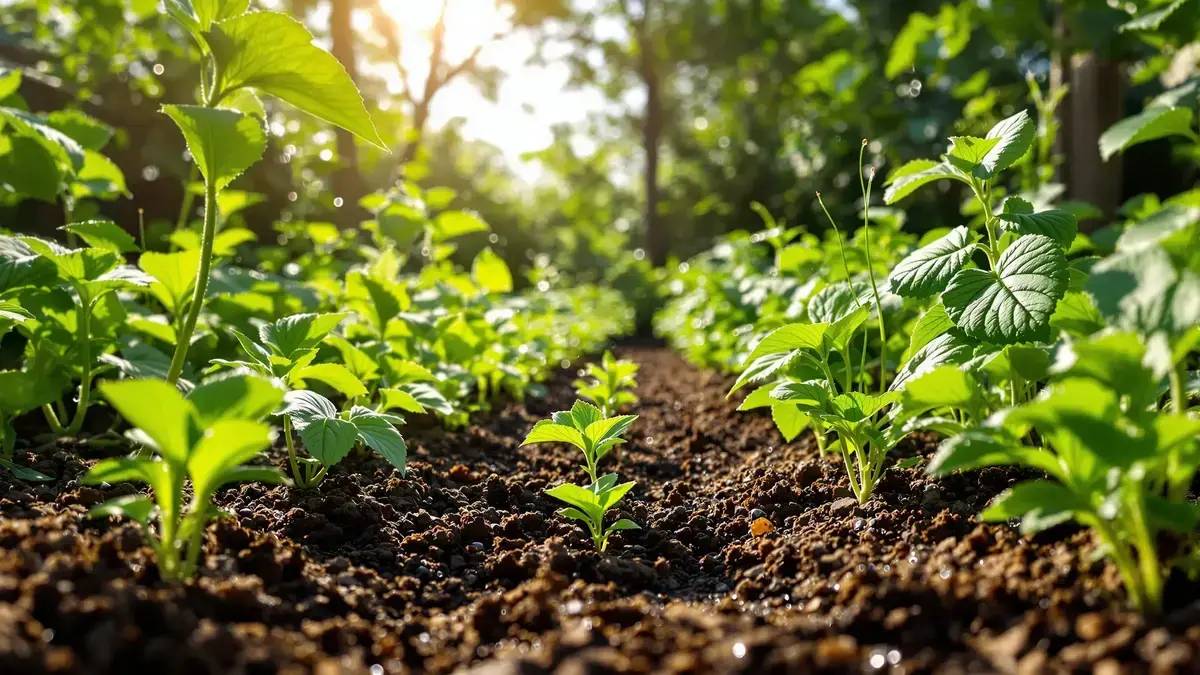In the face of increasing droughts and water restrictions, optimizing water management in our gardens becomes essential. An innovative and effective method is to use biochar, a charcoal derived from the pyrolysis of organic residues. This technique improves the water retention of the soil, transforming it into a true natural sponge while promoting the overall health of the garden and reducing the need for chemical fertilizers.
The key information
- Discover how a dry garden can be water-efficient through the use of biochar.
- Biochar enhances the water retention and porosity of the soil.
- Learn how to prepare and activate biochar for your garden.
- Optimize water use and promote the health of your garden while contributing to carbon sequestration.
Dry and Water-Efficient Garden
In a context where droughts are becoming increasingly frequent and water restrictions are tightening, it is crucial to find effective solutions to maintain the health of our gardens. One of the most efficient tricks is to transform your soil into a true natural sponge, capable of absorbing and retaining water. This not only reduces irrigation needs but also fosters an environment conducive to plant growth.
Tips for Absorbent Soil and Reduced Watering
The secret lies in the use of biochar, a charcoal produced by the pyrolysis of organic residues. This material has the ability to improve the water retention of the soil, regardless of its texture. By incorporating biochar, you transform your soil, whether sandy or heavy, into a true reservoir of water and nutrients, capable of gradually releasing these resources.
Increase in Droughts and Water Restrictions
With the rise of dry seasons and increasing restrictions concerning water use, it is imperative to optimize the use of this precious resource in our gardens. Biochar then emerges as a modern yet ancient solution to adopt. This material, by increasing the porosity of the soil, improves not only its capacity to retain water but also to maintain a nutritional balance without depleting water resources.
Biochar: Charcoal from the Pyrolysis of Organic Residues
Biochar is obtained through pyrolysis, a process that decomposes organic materials at high temperatures in the absence of oxygen. This process not only generates a useful product but also contributes to the reduction of organic waste. Once biochar is at your disposal, you can choose to buy it or make it at home, an option that can prove to be very economical.
Preparation: Purchase or Homemade
The preparation of biochar for your garden requires prior activation, which is done by mixing it with compost or manure. This step is crucial as it allows the biochar to benefit from the nutritional properties of organic materials and attract beneficial microorganisms. For effective incorporation, it is recommended to add approximately 10% biochar into the top 10 to 20 cm of soil.
This water that you think is dirty is actually a valuable resource for your plants
Monitoring Moisture to Adjust Watering
Once biochar is integrated, monitoring soil moisture becomes essential to adjust your watering. Thanks to the absorbent properties of biochar, the soil will act like a sponge, retaining water and nutrients, which allows you to reduce the frequency of watering and optimize water usage. This is a significant advantage, especially during drought periods.
Advantages: Improving Soil Structure
In addition to improving water retention, the use of biochar promotes a better soil structure and contributes to nutrient retention. This reduces the need for chemical fertilizers while fostering increased microbial activity. This process enhances soil biodiversity, which is crucial for sustainable gardening.
Increase in Microbial Activity
The benefits of biochar extend beyond water management. It also contributes to an increase in microbial activity, essential for soil health. The microorganisms present in compost or manure thrive better in the presence of biochar, creating a flourishing ecosystem that supports plant growth.
Contribution to Carbon Sequestration
By integrating biochar into your soil, you also contribute to carbon sequestration, a major environmental issue. This technique allows for the storage of carbon in the soil, thus aiding in the fight against climate change while improving the overall health of your garden.
Optimizing Water Use and Garden Health
In summary, the biochar technique represents an innovative and sustainable approach to optimize water in your garden while enhancing its health. The simple incorporation of this material could transform your garden into a space where plants thrive even under drought conditions. This is a practice that deserves to be adopted by all environmentally conscious gardeners.
Modern and Ancient Technique to Adopt
In conclusion, using biochar is a technique that combines modernity and ancestral know-how. It addresses current challenges related to water management and the sustainability of gardening practices. Adopting this method is an investment in the future of your crops while respecting natural resources. Take advantage of these innovations to ensure the longevity of your garden even in the most challenging conditions.















